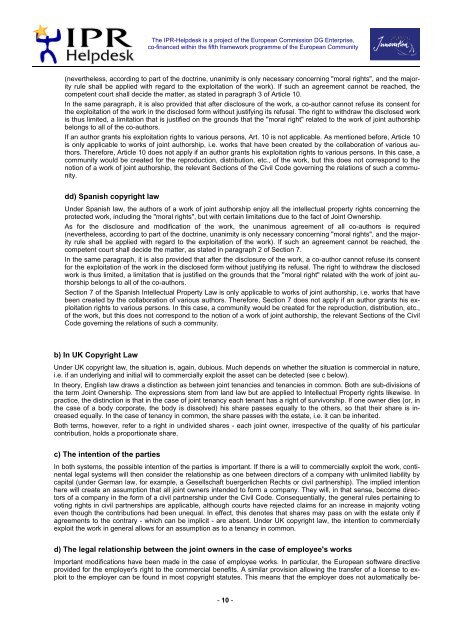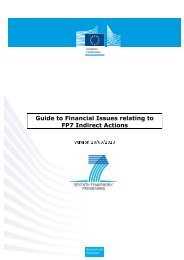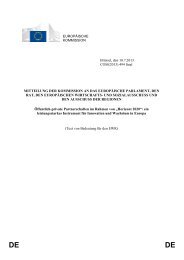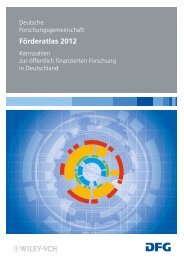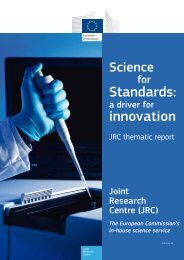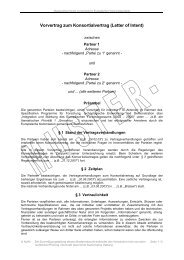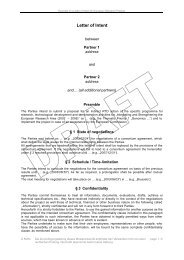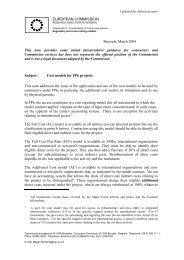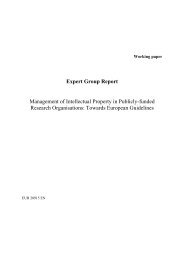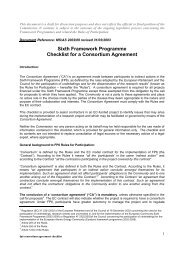Joint Ownership in Intellectual Property Rights - KoWi
Joint Ownership in Intellectual Property Rights - KoWi
Joint Ownership in Intellectual Property Rights - KoWi
Create successful ePaper yourself
Turn your PDF publications into a flip-book with our unique Google optimized e-Paper software.
The IPR-Helpdesk is a project of the European Commission DG Enterprise,<br />
co-f<strong>in</strong>anced with<strong>in</strong> the fifth framework programme of the European Community<br />
(nevertheless, accord<strong>in</strong>g to part of the doctr<strong>in</strong>e, unanimity is only necessary concern<strong>in</strong>g "moral rights", and the majority<br />
rule shall be applied with regard to the exploitation of the work). If such an agreement cannot be reached, the<br />
competent court shall decide the matter, as stated <strong>in</strong> paragraph 3 of Article 10.<br />
In the same paragraph, it is also provided that after disclosure of the work, a co-author cannot refuse its consent for<br />
the exploitation of the work <strong>in</strong> the disclosed form without justify<strong>in</strong>g its refusal. The right to withdraw the disclosed work<br />
is thus limited, a limitation that is justified on the grounds that the "moral right" related to the work of jo<strong>in</strong>t authorship<br />
belongs to all of the co-authors.<br />
If an author grants his exploitation rights to various persons, Art. 10 is not applicable. As mentioned before, Article 10<br />
is only applicable to works of jo<strong>in</strong>t authorship, i.e. works that have been created by the collaboration of various authors.<br />
Therefore, Article 10 does not apply if an author grants his exploitation rights to various persons. In this case, a<br />
community would be created for the reproduction, distribution, etc., of the work, but this does not correspond to the<br />
notion of a work of jo<strong>in</strong>t authorship, the relevant Sections of the Civil Code govern<strong>in</strong>g the relations of such a community.<br />
dd) Spanish copyright law<br />
Under Spanish law, the authors of a work of jo<strong>in</strong>t authorship enjoy all the <strong>in</strong>tellectual property rights concern<strong>in</strong>g the<br />
protected work, <strong>in</strong>clud<strong>in</strong>g the "moral rights", but with certa<strong>in</strong> limitations due to the fact of <strong>Jo<strong>in</strong>t</strong> <strong>Ownership</strong>.<br />
As for the disclosure and modification of the work, the unanimous agreement of all co-authors is required<br />
(nevertheless, accord<strong>in</strong>g to part of the doctr<strong>in</strong>e, unanimity is only necessary concern<strong>in</strong>g "moral rights", and the majority<br />
rule shall be applied with regard to the exploitation of the work). If such an agreement cannot be reached, the<br />
competent court shall decide the matter, as stated <strong>in</strong> paragraph 2 of Section 7.<br />
In the same paragraph, it is also provided that after the disclosure of the work, a co-author cannot refuse its consent<br />
for the exploitation of the work <strong>in</strong> the disclosed form without justify<strong>in</strong>g its refusal. The right to withdraw the disclosed<br />
work is thus limited, a limitation that is justified on the grounds that the "moral right" related with the work of jo<strong>in</strong>t authorship<br />
belongs to all of the co-authors.<br />
Section 7 of the Spanish <strong>Intellectual</strong> <strong>Property</strong> Law is only applicable to works of jo<strong>in</strong>t authorship, i.e. works that have<br />
been created by the collaboration of various authors. Therefore, Section 7 does not apply if an author grants his exploitation<br />
rights to various persons. In this case, a community would be created for the reproduction, distribution, etc.,<br />
of the work, but this does not correspond to the notion of a work of jo<strong>in</strong>t authorship, the relevant Sections of the Civil<br />
Code govern<strong>in</strong>g the relations of such a community.<br />
b) In UK Copyright Law<br />
Under UK copyright law, the situation is, aga<strong>in</strong>, dubious. Much depends on whether the situation is commercial <strong>in</strong> nature,<br />
i.e. if an underly<strong>in</strong>g and <strong>in</strong>itial will to commercially exploit the asset can be detected (see c below).<br />
In theory, English law draws a dist<strong>in</strong>ction as between jo<strong>in</strong>t tenancies and tenancies <strong>in</strong> common. Both are sub-divisions of<br />
the term <strong>Jo<strong>in</strong>t</strong> <strong>Ownership</strong>. The expressions stem from land law but are applied to <strong>Intellectual</strong> <strong>Property</strong> rights likewise. In<br />
practice, the dist<strong>in</strong>ction is that <strong>in</strong> the case of jo<strong>in</strong>t tenancy each tenant has a right of survivorship. If one owner dies (or, <strong>in</strong><br />
the case of a body corporate, the body is dissolved) his share passes equally to the others, so that their share is <strong>in</strong>creased<br />
equally. In the case of tenancy <strong>in</strong> common, the share passes with the estate, i.e. it can be <strong>in</strong>herited.<br />
Both terms, however, refer to a right <strong>in</strong> undivided shares - each jo<strong>in</strong>t owner, irrespective of the quality of his particular<br />
contribution, holds a proportionate share.<br />
c) The <strong>in</strong>tention of the parties<br />
In both systems, the possible <strong>in</strong>tention of the parties is important. If there is a will to commercially exploit the work, cont<strong>in</strong>ental<br />
legal systems will then consider the relationship as one between directors of a company with unlimited liability by<br />
capital (under German law, for example, a Gesellschaft buergerlichen Rechts or civil partnership). The implied <strong>in</strong>tention<br />
here will create an assumption that all jo<strong>in</strong>t owners <strong>in</strong>tended to form a company. They will, <strong>in</strong> that sense, become directors<br />
of a company <strong>in</strong> the form of a civil partnership under the Civil Code. Consequentially, the general rules perta<strong>in</strong><strong>in</strong>g to<br />
vot<strong>in</strong>g rights <strong>in</strong> civil partnerships are applicable, although courts have rejected claims for an <strong>in</strong>crease <strong>in</strong> majority vot<strong>in</strong>g<br />
even though the contributions had been unequal. In effect, this denotes that shares may pass on with the estate only if<br />
agreements to the contrary - which can be implicit - are absent. Under UK copyright law, the <strong>in</strong>tention to commercially<br />
exploit the work <strong>in</strong> general allows for an assumption as to a tenancy <strong>in</strong> common.<br />
d) The legal relationship between the jo<strong>in</strong>t owners <strong>in</strong> the case of employee's works<br />
Important modifications have been made <strong>in</strong> the case of employee works. In particular, the European software directive<br />
provided for the employer's right to the commercial benefits. A similar provision allow<strong>in</strong>g the transfer of a license to exploit<br />
to the employer can be found <strong>in</strong> most copyright statutes. This means that the employer does not automatically be-<br />
- 10 -


